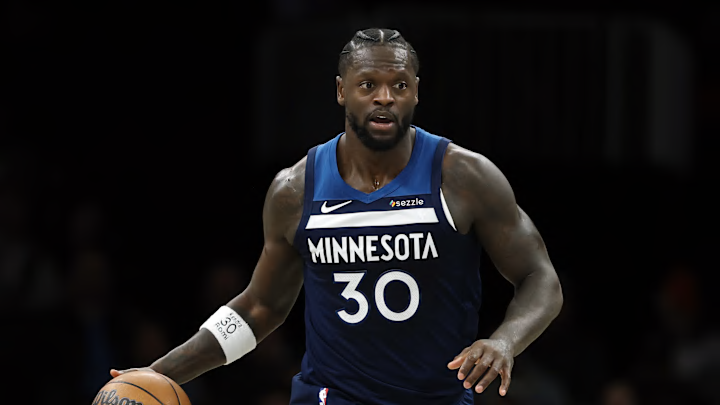If there was one well-discussed flaw about the Minnesota Timberwolves heading into the season, it was their point guard play. With Mike Conley turning 38 shortly before the season, and Rob Dillingham, conversely, being a raw 20-year-old, this was an understandable concern. After the Wolves opted to start Donte DiVincenzo over Conley, it was clear Chris Finch's preferred starting lineup would operate without a traditional point guard.
While the Wolves' point guard play has been far from perfect, Julius Randle has been used as the primary initiator and de facto point guard. Anthony Edwards has taken this role at times, but it's truly been Randle's playmaking that has made this offense work. The Wolves have the fifth-ranked offense, and Randle's impact as a playmaker and scorer has been vital to this success. Notably, Randle is averaging 2.9 more assists and 4.9 more passes per game than Ant.
It's not entirely shocking that Randle is taking on this de facto point guard role; he led the team in assists per game last year. I anticipated Randle (and Edwards) to be used in this de facto point guard role. However, I never imagined just how much responsibility Randle would have and just how effective he would be in this role.
Randle's playmaking is key to the Wolves' offense
Last year, Randle averaged an impressive 4.7 assists; now he is averaging 6.2 assists. This number ranks 18th in the entire NBA and fourth among players not listed as guards. Randle's usage rate has also risen from 25 to 28.1. Per Databallr, his on-ball percentage went up from 18.9 to 22.6, which puts him in the 94th percentile for his position. Overall, Randle has an absurd +25.1 net on/off offensive swing.
Randle's versatility as a passer really stands out to me. The 6-foot-9 forward can organize the offense like a traditional point guard, be used as a playmaking hub out of the high post, and he can find shooters and cutters when he drives.
Julius Randle passing highlights 11 games into the season pic.twitter.com/lHZOl2GeEM
— Eamon Cassels (@EamonCassels) November 11, 2025
A big part of Randle's impact as a passer is that teams are focused on taking away Randle's scoring, which in turn opens up opportunities for him as a playmaker. Impressively, he averages 25.4 points, and his 1.42 points per isolation rank second in the NBA.
Another thing that's really stood out to me with Randle is his decision-making; he almost always makes the right read despite often being double-teamed. While he has taken on extra playmaking duties, his turnovers are the lowest since his Los Angeles Lakers days.
Randle's playmaking opens up things for the entire team, but Edwards benefits the most. Notably, 44 percent of Edwards' assisted baskets come from Randle. Likewise, Randle's presence takes pressure away from Edwards. Considering his impact as both a scorer and playmaker, Randle is arguably having the best season of his career so far.
Ultimately, it's still fair to have concerns about the Wolves' lack of a traditional point guard, but Randle has offered a unique solution to this problem so far.
